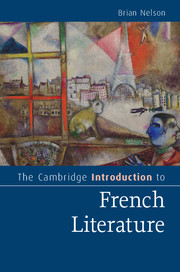Book contents
- Frontmatter
- Dedication
- Contents
- Preface
- Acknowledgements
- Chronology
- 1 Villon: a dying man
- 2 Rabelais: the uses of laughter
- 3 Montaigne: self-portrait
- 4 Corneille: heroes and kings
- 5 Racine: in the labyrinth
- 6 Molière: new forms of comedy
- 7 La Fontaine: the power of fables/fables of power
- 8 Madame de Lafayette: the birth of the modern novel
- 9 Voltaire: the case for tolerance
- 10 Rousseau: man of feeling
- 11 Diderot: the enlightened sceptic
- 12 Laclos: dangerous liaisons
- 13 Stendhal: the pursuit of happiness
- 14 Balzac: ‘All is true’
- 15 Hugo: the divine stenographer
- 16 Baudelaire: the streets of Paris
- 17 Flaubert: the narrator vanishes
- 18 Zola: the poetry of the real
- 19 Huysmans: against nature
- 20 Mallarmé: the magic of words
- 21 Rimbaud: somebody else
- 22 Proust: the self, time and art
- 23 Jarry: the art of provocation
- 24 Apollinaire: impresario of the new
- 25 Breton … Company: Surrealism
- 26 Céline: night journey
- 27 Sartre: writing in the world
- 28 Camus: a moral voice
- 29 Beckett: filling the silence
- 30 French literature into the twenty-first century
- Notes
- Further reading
- Index of authors and titles
- Index of genres, movements and concepts
- Cambridge Introductions to …
- References
20 - Mallarmé: the magic of words
Published online by Cambridge University Press: 05 July 2015
- Frontmatter
- Dedication
- Contents
- Preface
- Acknowledgements
- Chronology
- 1 Villon: a dying man
- 2 Rabelais: the uses of laughter
- 3 Montaigne: self-portrait
- 4 Corneille: heroes and kings
- 5 Racine: in the labyrinth
- 6 Molière: new forms of comedy
- 7 La Fontaine: the power of fables/fables of power
- 8 Madame de Lafayette: the birth of the modern novel
- 9 Voltaire: the case for tolerance
- 10 Rousseau: man of feeling
- 11 Diderot: the enlightened sceptic
- 12 Laclos: dangerous liaisons
- 13 Stendhal: the pursuit of happiness
- 14 Balzac: ‘All is true’
- 15 Hugo: the divine stenographer
- 16 Baudelaire: the streets of Paris
- 17 Flaubert: the narrator vanishes
- 18 Zola: the poetry of the real
- 19 Huysmans: against nature
- 20 Mallarmé: the magic of words
- 21 Rimbaud: somebody else
- 22 Proust: the self, time and art
- 23 Jarry: the art of provocation
- 24 Apollinaire: impresario of the new
- 25 Breton … Company: Surrealism
- 26 Céline: night journey
- 27 Sartre: writing in the world
- 28 Camus: a moral voice
- 29 Beckett: filling the silence
- 30 French literature into the twenty-first century
- Notes
- Further reading
- Index of authors and titles
- Index of genres, movements and concepts
- Cambridge Introductions to …
- References
Summary
The pure work implies the elocutionary disappearance of the poet, who leaves the initiative to words.
–Mallarmé, ‘Crisis in Verse’The reader of Huysmans's Against Nature learns that the favourite writer of the novel's aesthete hero, Des Esseintes, is the famously enigmatic poet Stéphane Mallarmé (1842–98). Mallarmé returned the compliment, so to speak, with his famous hermetic poem ‘Prose pour des Esseintes’ (1885). Just as Des Esseintes flees modern life by withdrawing into a world of his own making, the poetry (in both verse and prose) of Mallarmé is based on an aesthetic ideal of self containment. Central to Mallarmé's poetic principles is his vision of a ‘pure work of art’ (letter to François Coppée, 20 April 1868) independent of the world outside it – either the life of the author or the society in which the author lives. He dreamed, as he wrote to his fellow poet Paul Verlaine (1844–96), of ‘a Text [that] would speak of and by itself, without the voice of an author’ (letter dated 16 November 1885). ‘The pure work,’ he states in ‘Crisis in Verse’ (‘Crise de vers’, 1897), ‘implies the elocutionary disappearance of the poet, who leaves the initiative to words’. He sought to develop a poetics that emphasized the patterns created within the self-enclosed structure of a poem, by the words composing it, rather than the referential function, however symbolic, of those words. According to a well-known anecdote, the painter Edgar Degas once sought Mallarmé out to ask for his advice on how to complete a sonnet he was trying to write. He had spent the whole day on it, he said, but was going nowhere – despite the fact that he had ideas coming out of his ears. ‘But, Degas, you don't make a poem out of ideas,’ said Mallarmé. ‘You make it with words.’
The writer's compelling task, wrote Mallarmé, was to ‘purify the language of the tribe’.
- Type
- Chapter
- Information
- The Cambridge Introduction to French Literature , pp. 147 - 150Publisher: Cambridge University PressPrint publication year: 2015



